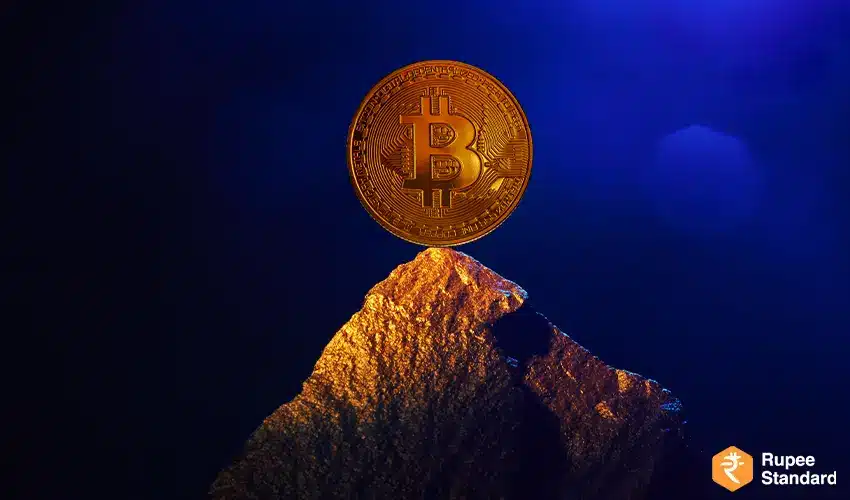Bitcoin mining in India: Legality status
In India, the regulatory landscape surrounding cryptocurrencies, including mining activities, has been subject to evolving interpretations and policies. Perhaps, to understand this in detail, we must look at the cryptocurrency regulations in India:
The Reserve Bank of India (RBI), the country’s central bank, has expressed concerns about cryptocurrencies and issued multiple circulars since 2013, cautioning users and entities about their potential risks. In April 2018, the RBI issued a circular prohibiting regulated entities from dealing with cryptocurrencies, effectively placing a ban on cryptocurrency trading and related services.
However, in March 2020, the Supreme Court of India passed a judgment that overturned the RBI circular, deeming it unconstitutional. The court ruled that the circular violated citizens’ rights and emphasized the need for regulatory frameworks rather than outright bans.

Current regulations for Bitcoin mining in India
While the Supreme Court ruling lifted the ban on cryptocurrency trading, the Indian government has not yet introduced comprehensive regulations specifically addressing bitcoin mining. This lack of specific regulations has created some ambiguity regarding the legal status of mining activities in the country.
It is crucial to note that bitcoin mining involves solving complex mathematical problems using high-powered computer systems. Miners contribute their computational power to secure the network and validate transactions, earning bitcoin rewards in return. Mining operations require significant energy consumption and computing resources.
Legal interpretations and other concerns in India
Given the absence of explicit regulations, legal experts have varied interpretations of the legality of bitcoin mining in India. Some argue that mining does not fall under the purview of the previous RBI circular that banned cryptocurrency trading.
This assumption is made as mining is a distinct activity that supports the blockchain infrastructure rather than direct cryptocurrency trading. However, concerns have been raised regarding the potential impact of mining on the national power grid and the environmental implications of high energy consumption.
These concerns, coupled with the lack of regulatory clarity, have resulted in mixed opinions on the legality of mining operations.
Government Stance and Pending Legislation
The Indian government has shown a cautious approach towards cryptocurrencies, with discussions underway to introduce a comprehensive regulatory framework.
In early 2021, the government proposed the Cryptocurrency and Regulation of Official Digital Currency Bill, which aims to create a framework for regulating digital currencies, including potential restrictions on mining activities.
The bill proposes to ban private cryptocurrencies while allowing the development and promotion of a central bank digital currency (CBDC). However, the bill’s status and the specific regulations related to mining are yet to be finalized and implemented.

How is crypto mined?
Cryptocurrency mining is the process by which new units of a cryptocurrency are created and transactions are verified and added to the blockchain ledger. While the specifics may vary depending on the cryptocurrency, the general steps involved in mining can be outlined as follows:
Blockchain and consensus mechanism
Cryptocurrencies operate on decentralized networks called blockchains, which are distributed ledgers that record all transactions. Different cryptocurrencies may use different consensus mechanisms, such as Proof of Work (PoW) or Proof of Stake (PoS), to validate and secure transactions. In this article, we will focus on the most common method, PoW.
Mining hardware
To mine cryptocurrencies, specialized mining hardware is typically used. In the case of Bitcoin and many other cryptocurrencies, the hardware used is known as Application-Specific Integrated Circuit (ASIC) miners. These devices are designed specifically for mining and offer high computational power to perform the necessary calculations efficiently.
Mining software
Miners also need mining software, which connects their hardware to the cryptocurrency network. The software facilitates communication with the blockchain and performs the required computations for mining.
Block verification
Miners collect pending transactions from the network and group them into blocks. Each block contains a specific number of transactions. Miners verify the validity of transactions by ensuring that the sender has sufficient funds and that the transaction adheres to the rules of the cryptocurrency.
Hashing and proof of work
In a PoW system like Bitcoin, miners compete to solve a complex mathematical problem, known as the cryptographic hash function. This problem requires a significant amount of computational power and is designed to be difficult to solve but easy to verify. Miners repeatedly apply the hash function to a block’s data, combined with a random number called a nonce, until they find a solution that meets specific criteria.
Difficulty adjustment
The difficulty of the mathematical problem adjusts regularly to maintain a consistent rate of block creation. As more miners join the network, the difficulty increases to ensure that blocks are not generated too quickly. Conversely, if miners leave the network, the difficulty decreases to maintain the desired block creation rate.

Block reward
Once a miner finds a valid solution, they broadcast it to the network for verification by other participants. If the solution is accepted, the miner is rewarded with a certain amount of newly created cryptocurrency. This is often referred to as the block reward. In addition to the block reward, miners may also receive transaction fees associated with the transactions included in the block.
Block addition and chain confirmation
Once the solution is accepted and the block is added to the blockchain, the other miners verify its validity and begin working on the next block. Each subsequent block is linked to the previous one, forming a chain of blocks.
Continuous mining
The mining process continues as long as there is an incentive for miners to participate. In the case of Bitcoin, for example, the block reward is halved at specific intervals, known as “halvings,” reducing the number of newly minted bitcoins over time.
It is important to note that the mining process can be energy-intensive, particularly for cryptocurrencies that use PoW consensus mechanisms. Miners consume electricity to power their mining hardware, which has led to discussions around the environmental impact of mining operations.
Overall, cryptocurrency mining is a fundamental process that ensures the security and integrity of blockchain networks. It incentivizes participants to contribute their computational power and resources to maintain and validate the decentralized nature of cryptocurrencies.
Indian crypto mining activities
Based on all that we have discussed above, we hope to have answered the question that is, is crypto mining legal in India? As it stands, the legal status of bitcoin mining in India remains somewhat uncertain due to the lack of specific regulations addressing mining activities.
The Supreme Court of India ruling lifting the ban on cryptocurrency trading provided a positive development for the broader cryptocurrency ecosystem. However, until comprehensive regulations are enacted, the legal implications of mining operations in India remain open to interpretation.

Individuals and entities engaged in or considering bitcoin mining in India should closely monitor developments in cryptocurrency regulations. It is advisable to seek legal counsel to ensure compliance with any future regulations and to mitigate potential risks associated with mining operations.
Note: This article is based on current knowledge. Cryptocurrency regulations are subject to change, and it is essential to stay updated with the latest legal developments and consult with legal professionals or relevant authorities for the most accurate and current information.
Perhaps, if you are just looking to trade in crypto currencies and are specifically targeting coins that are less volatile, Rupee Standard is your best option.


